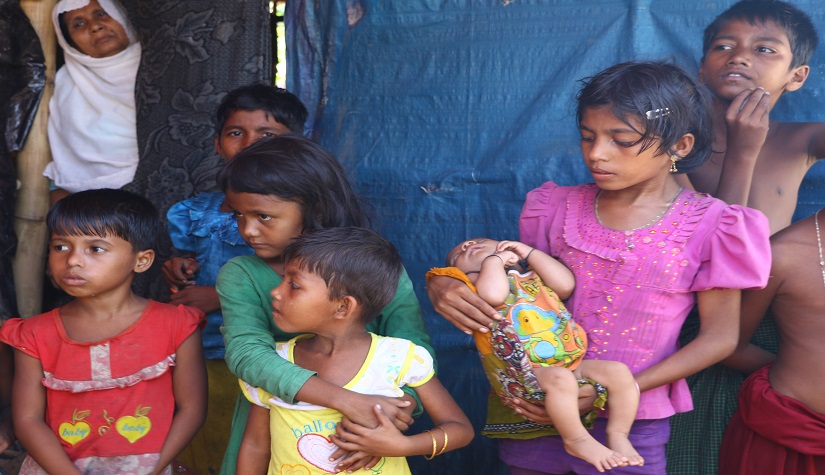Rohingya ‘Extremely Anxious’ over COVID-19 in World’s Largest Refugee Camp
“I am extremely anxious. So do many of us. It will be a disaster if we cannot prevent it”- By Mohammed Rafique
- 25 March 2020, 22:56

As the novel coronavirus COVID-19 takes over the world crippling economics, locking down cities and countries, and cutting off communities, Rohingya in the world’s largest refugee camp in Bangladesh are already in extreme panic and hapless circumstances.
Bangladesh has declared a 10-day public holiday from March 26 to April 4 to combat and contain the spread of the virus. The country has seen a total-death of five people with over 39 reported cases of COVID-19.
Bangladesh bans land and water public transportations and urges people to “maintain home quarantine very strictly and avoid any mass gatherings. Troops are deployed in every district across Bangladesh to enforce social distancing.
A Double-Lockdown
Over a million Rohingya refugees who fled neighbouring Myanmar during a series of genocidal campaigns since 1991-92, are taking shelters in Cox’s Bazar region of Bangladesh.
Bangladesh, which has shown compassion and solidarity towards the victims of genocide, has taken measures to partial or complete travel restrictions outside the refugee camps even before the COVID-19 virus was discovered in Wuhan, China.
The recent announcement to lockdown the country and enforcement of social distancing has created a double-lockdown for the refugees who continue to live in limbo.
Internet Shutdown
In September 2019, Bangladesh has also shutdown 3G and 4G internet for Rohingya refugees in the camps.
The internet shutdown has created severe impediments in communication with their friends and families outside the camps, in delivery of humanitarian and emergency aid, and has become a hindrance in the dissemination of accurate healthcare information.
Rohingya Medics Organisation, a Rohingya-doctor-found non-profitable organisation, has called the government of Bangladesh to ease the internet shutdown in order for the refugees to be accessible to critical and vital information on the COVID-19.
Rohingya Medics call for social distancing and restoration of internet access in the refugee camps.
High-risk Population
As hundreds of people die each day in all over the world, scientists and doctors have warned that the mortality of the virus is high among the people with pre-existing health problems and among the elderly population.
High-risk population groups such as people with Diabetes, Hepatitis, Hypertension, Tuberculosis and other pulmonary (lung) diseases are abundant in the Rohingya refugee camps.
Lack of intensive health services
Coupled with the overpopulation, communication breakdown and inadequate services, the high-risk Rohingya refugees are in very vulnerable circumstances as there is no intensive health care services and infrastructures within the camps.
Even highly-developed countries in Europe face uphill tasks in caring and treating COVID-19 patients in already depleted and overcrowded intensive care.
For many years, Rohingya refugees have raised awareness on the lack of medical staff, robust medical infrastructure and essential medical equipment and medications.
Lack of Basic Personal Protection
World Health Organisation (WHO) and Centers for Disease Control and Prevention (CDC) have long-been recommended that PPE (Personal Protection Equipment) are vital in the management of suspected and confirmed cases of COVID-19.
Masks such as medical-grade N95 masks are non-existent in the camps. So do kits to test the virus. Hand sanitation also remains a difficult task for the refugees due to the lack of soaps, disinfectants and scarcity of water.
Dependency, Independency on Food Rations
Almost the entire Rohingya refugees depend on monthly rations provided by World Food Programme (WFP) and other local and international NGOs.
Newly-arrived Rohingya refugees in 2016 and 2017 mostly receive food rations such as rice, cooking oil, salt, beans.
However, there are many Rohingya, particularly refugees fled in 1991-92, who don’t receive any rations as the result of protests against repatriation to Myanmar or relocation to Bhansar Char island, or being neglected in the ration cards.
With the enforcement of social distancing and lockdown into its full swing, the refugees without rations find themselves in extremely difficult situations in order to survive in the pandemic.
Panic buying and Spike in Price
After Bangladesh’s declaration on the lockdown of social gatherings and transportations, many Rohingya refugees went to shops and markets located inside the camps to buy goods.
It is reported that a number of shops have taken advantage of the lockdown to spike prices of fruits, vegetables, meats, fishes and essential food.
“Today, I went to a shop to buy eggplants (aubergines). They are now 85 Taka per kilo, which were only 30 a few days ago,” told Halima Begum to The Rohingya Post.
“A lot of people in the camp are already in distress over the virus,” she continued.
Extreme Anxiety among Refugees
Rohingya refugees in the camps reportedly show general anxiety on the spread and mortality of COVID-19.
“We are slowly trying to forget our physical and mental traumas that we have experience in Myanmar during the genocide. Now, we are in another fight to overcome. This time, we know that there is a major disease in our doors. But we don’t have resources to prevent it and protect our loved ones from it.
“I am extremely anxious. So do many of us. It will be a disaster if we cannot prevent it. For that we need internet, we need volunteers, we need more accurate information and awareness, we need doctors, we need medical equipment and we need more solidarity and compassion,” expressed Sayed Alam, an elderly Rohingya refugee from the World’s Largest Refugee Camp, Kutupalong Refugee Camp.
[Views expressed in this article are the author’s own and do not necessarily reflect the editorial policy of the Daily Nayadiganta]
More News
-
- ৫ঃ ৪০
- খেলা
-
- ৫ঃ ৪০
- খেলা
-
- ৫ঃ ৪০
- খেলা

